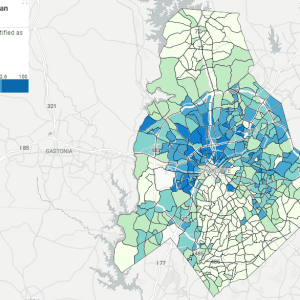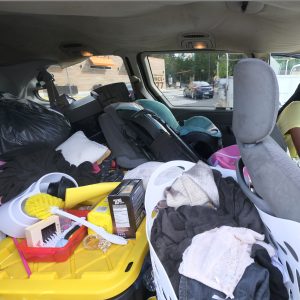Data

How are Housing Choice Vouchers distributed across Southeastern Cities?
This research was used by USA Today for an investigative series called ‘Segregated by Section 8.’ The series is available online here (subscriber-only). Housing Choice Vouchers are a subsidy that helps extremely low income individuals and families (defined by HUD as earning less than 30% of area median income) afford housing in the private market. […]

New maps let you explore patterns of income, racial segregation and more
Where you live in Charlotte and Mecklenburg County might reflect your race, income, education level, how old you are and even how likely you are to be in an area where eligible streams are adopted for clean-up. Newly updated maps from the Charlotte-Mecklenburg Quality of Life Explorer let you explore all these factors and more. […]

Part 1: How the Blue Line Extension changed Charlotte development
The pandemic has transformed so much about the world, including how we work, where we work, and how we commute. As a result of these shifts, Charlotte area transit use has fallen to less than 50% of pre-pandemic levels. And while debates continue on whether these effects are permanent or temporary, city planners are pushing […]

Data that show why Charlotte houses are so expensive – and scarce
Buying a house in the Charlotte region has, in many ways, never been more challenging. Buyers face a dizzying array of obstacles: A historic supply crunch, skyrocketing prices and homes that sell faster and faster each month. The reasons are numerous. Housing supply never fully recovered after the 2008 economic crash and Great Recession drove […]

Supporting Charlotte’s minority-owned small businesses
A study released this week by the UNC Charlotte Urban Institute sheds light on the unique challenges minority-owned small businesses face and how the Charlotte-Mecklenburg community can better support these enterprises, which are key to community well-being and wealth-building. Defined as businesses with fewer than 500 employees, small businesses comprise 99.9% of all businesses. Small […]

Poverty suburbanization and job access: A new study tests ‘spatial mismatch’
Does where you live — and what jobs you have access to — influence whether you work, and how much you earn? The long-held “spatial mismatch” theory posits that inner city unemployment and poverty has been driven in large part by the increasing physical separation of inner city residents from job opportunities, as suburbs boomed […]

Wall Street-backed landlords now own more than 11,000 single-family homes in Charlotte
For decades, the single-family home rental market was a small-scale industry, made up almost entirely of local landlords who rented out a few houses they bought as investment properties, or perhaps inherited, or held on to after relocating. But the years since the Great Recession have witnessed a dramatic shift, as Wall Street-backed rental companies […]

Tracking confirmed coronavirus cases in our region
This map shows the cumulative number of confirmed coronavirus cases per 100,000 residents in the 14-county region the UNC Charlotte Urban Institute serves. The number varies significantly between the counties, which could be a reflection of factors ranging from population density to how many tests have been administered. This map, and the below graphics, will […]

New report release: Single adult homelessness integrated data
Mecklenburg County Community Support Services recently released the Single Adult Homelessness Integrated Data (SAHID) Report. This is the first community report focused specifically on single adult homelessness. The report is part of the Charlotte-Mecklenburg Housing Instability & Homelessness Report Series, which is funded by Mecklenburg County Community Support Services and completed by the UNC Charlotte […]

Trust in neighbors and police: Who has it and what does it mean for Charlotte?
This article was written by the UNC Charlotte Urban Institute. Data used in this series was collected in partnership with Leading on Opportunity, Opportunity Insights, Communities in Schools, YMCA of Greater Charlotte, Foundation For The Carolinas, and SHARE Charlotte, with staff funding from The Gambrell Foundation. See more results from the 2019 Mecklenburg Social Capital […]